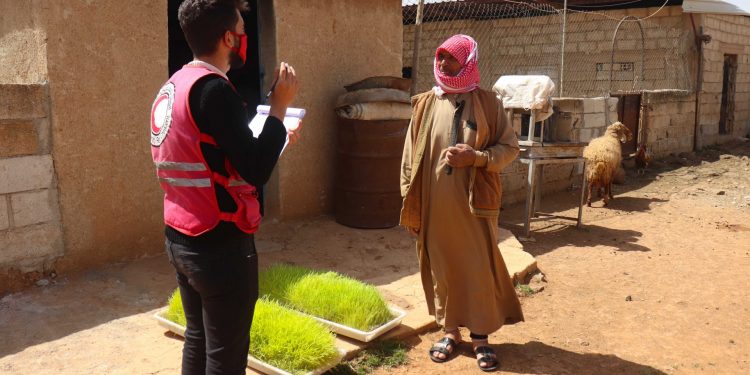After the families received the first batch of the feed grant, the Syrian Arab Red Crescent volunteers finish the second and final phases of the project by distributing another batch of feed (300 kg), in addition to following up the beneficiaries throughout the project period after teaching them the barley cultivation method, to help them achieve food security for their livestock for a longer period, as well as reduce the financial burden needed to buy feed.
The feed grant in brief
The feed grant is considered the second community project implemented by the Livelihoods Program in Daraa. It was chosen after an assessment of the needs of the people that covered the city of Busra, its villages and its affiliated areas. This project aims to protect the sheep and goats that are essential for the reproduction and production process by providing the needed feed. This project benefited 150 sheep and goat breeders, as they obtained the following inputs:
• 600 kg of feed – 200 kg of barley – 9 culture trays as a first batch.
• 300 kg of feed as a second batch.
• Teaching them how to grow barley.
Basic assessment criteria for selecting beneficiaries
Based on their duty to meet the needs of the most vulnerable groups and give a helping hand, the Syrian Arab Red Crescent volunteers selected 150 animal breeders to benefit from the feed grant based on the following criteria:
1- Mandatory standards:
• Breeders who own no more than 12 sheep and goats.
• Families facing challenges in providing feed for their animals.
• Families that mainly depend on sheep and goat products as a source of income.
• Provide adequate and suitable place to store the provided feed safely.
• Availability of a suitable place to establish the feed production system with water trays.
• families not included in similar programs.
2- Additional selection criteria:
• Families with a high dependency ratio (one or no breadwinner).
• Families that contain members with special needs, such as people with disabilities.
• The most economically vulnerable families, such as low income, to meet the expenses of basic needs.


